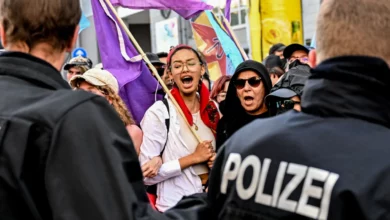Benghazi–Rebels said they suffered heavy losses in eastern Libya after being "tricked" by Muammer Qadhafi's forces, as the US pressed Africa to take tougher action against the strongman's regime.
The rebels meanwhile gained another diplomatic boost when Germany recognized their National Transitional Council (NTC) as the "legitimate representative" of the Libyan people.
On the battlefield however, the insurgents came under attack on numerous fronts by Qadhafi loyalists amid a surge of fighting across the country after weeks of stalemate.
On the eastern frontline between the rebel-held transport hub Ajdabiya and the oil town of Brega, which is in the hands of Qadhafi's soldiers, a firefight on Monday left 21 rebel combatants dead, their commander told AFP.
"Our men were tricked. Qadhafi's soldiers pretended to surrender, coming with a white flag, and then they fired on us," Mussa al-Mograbi said.
About 20 rebels were wounded and transferred to hospital in Ajdabiya, 160 kilometers (100 miles) south of Benghazi, the de facto capital of rebels who have been fighting to overthrow Qadhafi since mid-February, he said.
Mograbi added that four of his men were killed and 30 wounded in a skirmish the previous day.
Battles were also being fought in the western town of Zintan, the Berber mountains southwest of Tripoli, in nearby Yafran, and at Dafneya near Misrata, Libya's third city, rebel sources told AFP.
An AFP correspondent said Qadhafi's forces pounded the outskirts of Zintan on Sunday, killing at least seven rebels and wounding 49.
In Addis Ababa, US Secretary of State Hillary Clinton on Monday pressed all African states to demand Qadhafi step down and take tougher action against his regime.
Seeking to wrest support from a leader who has helped them financially, Clinton also urged African countries to expel Qadhafi's diplomats and increase their support for the opposition, saying their words and actions can help bring peace to Libya.
"I urge all African states to call for a genuine ceasefire and to call for Qadhafi to step aside," the first US chief diplomat to speak to the African Union said during a visit to the body's headquarters in Addis Ababa.
Senegal and Gambia are the only African states to have recognised the NTC as the legitimate interlocutor of the Libyan people.
In Benghazi on Monday, German Foreign Minister Guido Westerwelle said after meeting rebel leaders that Germany now recognizes the NTC as the "legitimate representative" of the Libyan people.
"We want a free Libya, in peace and democracy without Kadhafi," he added.
Berlin abstained from a UN Security Council resolution vote on 17 March backing intervention in Libya and chose not to join the NATO-led air war, but Defence Minister Thomas de Maiziere said last week it would be ready to consider sending peacekeeping troops to Libya if and when Qadhafi falls.
In Amman, NTC chairman Mustafa Mohamed Abdel Jalil told reporters Germany's recognition "will definitely boost international support for the Libyan revolt."
"Such political gains are key to the revolt and prove that Qadhafi's regime has finished," he said.
Qadhafi remains adamant he will not step down, according to the head of the World Chess Federation Kirsan Ilyumzhinov, who said that during a game of chess in Tripoli on Sunday the strongman insisted he had no position of power to relinquish.
"I am neither premier nor president nor king. I do not hold any post in Libya and therefore I have no position which I should give up," Ilyumzhinov quoted Qadhafi as telling him.
In Tripoli, the regime spokesman said its forces had eliminated rebel "pockets of resistance" at Zawiyah west of the capital.
Mussa Ibrahim told reporters Qadhafi's forces had "total control" of the area from Ajdabiya in the east to the Tunisian border in the west.
In London, the head of the Royal Navy said Britain could have to make tough choices about its military priorities if the Libya campaign drags on.
Admiral Mark Stanhope, the First Sea Lord, said Britain might have to rethink its priorities if the operation went on longer than six months.
"How long can we go on as we are in Libya?" Stanhope asked at a media briefing.
"Certainly in terms of NATO's current time limit that has been extended to 90 days, we are comfortable with that.
"Beyond that, we might have to request the government to make some challenging decisions about priorities."
Britain has been one of the chief players in the NATO military alliance enforcing a United Nations mandate.
Their mission is to enforce a no-fly zone and protect civilians in Libya as Qadhafi attempts to crush the rebel uprising.




